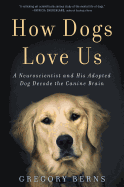 Children's books were as prominent as adult titles at the Northern California Independent Booksellers Association meeting and trade show held last week in South San Francisco--further proof that the association has taken its commitment to kids' books seriously two years after absorbing the Northern California Children's Booksellers Association.
Children's books were as prominent as adult titles at the Northern California Independent Booksellers Association meeting and trade show held last week in South San Francisco--further proof that the association has taken its commitment to kids' books seriously two years after absorbing the Northern California Children's Booksellers Association.
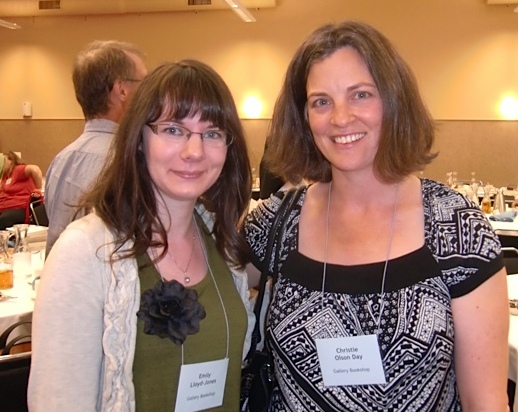 |
| Bookseller and author Emily Lloyd-Jones (l.) (her debut novel, Illusive, will be published by Little, Brown in 2014) with her boss, Christie Olson Day, owner, Gallery Bookshop, Mendocino Calif. |
In its second year, the children's author tea was sold out. David Shannon's speech about his new book, Bugs in My Hair! (Blue Sky Press/Scholastic), might have left the booksellers itching, but they stayed in their seats for the rest of the stellar line-up of speakers. Neal Shusterman said that a series of unconnected news items--about parents fearing their own teens, about abortion, and about medicine soon allowing for the human body to be 100% recyclable--led him to imagine a future where teens are used for body parts, which he explored in Unwind, UnWholly and the forthcoming UnSouled (Simon & Schuster). "Where are you if your body is divided among hundreds of people?" he asked. He's almost done with the fourth book in what's being called the Unwind Dystology. "We created a word," said Shusterman.
Graphic novelist Gene Luen Yang, best known for his National Book Award-nominated American Born Chinese, said he wrote the two-volume Boxers & Saints, which tells the story of China's Boxer Rebellion through the perspectives of two young people on opposite sides of the conflict, because, "I couldn't decide who the good guys and the bad guys were." Yang said he remembered that his Bay Area church honored the Chinese saints of the Boxer time period, and learned more about the century of war in his ancestral land when, during his research, he discovered that militarized young men found relief in the high drama of Chinese opera--as young people now respond to the superheroes popular in cosplay.
Cynthia Voigt told tea attendees that she wished she could tell a great story about how her ideas originate, but the truth is her first grandson was named Max and she soon began calling him Mister Max because "he was short and couldn't talk back." That led to her book, Mister Max: The Book of Lost Things (Knopf Books for Young Readers). "I consider myself a plotting-impaired writer," she said, "so every once in a while, you should write a mystery because you have to not make mistakes and you can't slide over anything."
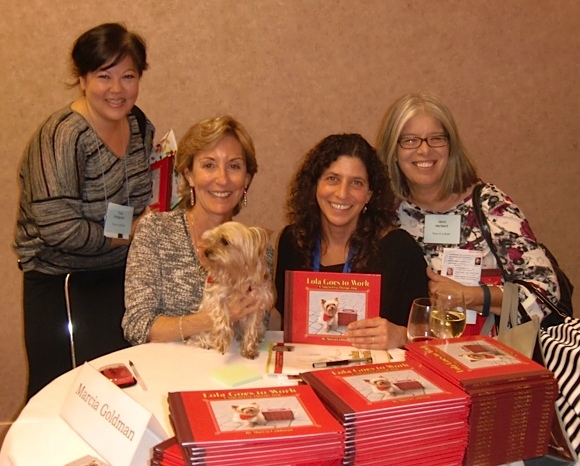 |
| Tina Ferguson, owner, Face in a Book, El Dorado Hills, Calif.; Marcia Goldman, author of Lola Goes to Work, with Marissa Moss, her publisher at Creston Books; and Janice Herbert of Face in a Book. |
At the children's rep pick session, Susan McConnell from Publishers Group West highlighted the first list published by Creston Books, a company launched by local bookseller favorite Marissa Moss, author of the Amelia's Notebooks series and other children's and YA books. She focused on two titles from the list: the cozy pleasures of life around the world in Elisa Kleven's Cozy Light, Cozy Night, and the trials, tricks and triumphs of navigating the world with autism in How to Be Human: Diary of an Autistic Girl by Florida Frenz, the pen name of an autistic teen.
Of course, books for adult readers sparked much interest as well. NCIBA kicked off its two-day program with a keynote talk by Nancy Horan, author of Loving Frank and the forthcoming novel Under the Wide and Starry Sky (Ballantine), about Robert Louis Stevenson and his relationship with American divorcée Fanny van de Grift Osbourne. Horan explained that Stevenson suffered from tuberculosis, and he and Fanny searched for the right climate for his health and even spent their honeymoon in an abandoned California gold mine, which was just one of the places the author visited while working on her "sophomore effort."
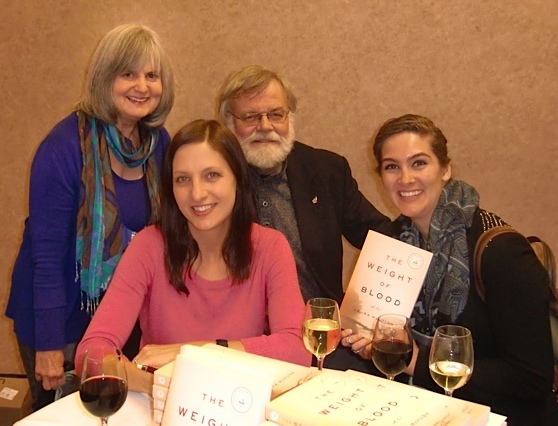 |
| Judy Wheeler, owner, Towne Center Books, Pleasanton, Calif.; Laura McHugh, author of The Weight of Blood (Spiegel & Grau); Random House rep Ron Shoop; and Claire Margetts from Towne Center Books. |
Brian Payton discussed his second novel, The Wind Is Not a River (Ecco), at the buzz lunch. In it, a journalist who wants to find meaning in his brother's death during World War II embarks on a journey after a fight with his wife that they both regret. He becomes lost in Alaska's Aleutian Islands, where he must hide from Japanese invaders. Carol Cassella said it made sense that she would write a novel called Gemini, about issues of medical ethics and identity; she's a physician and mother of two sets of twins. Cassella, who lives on Bainbridge Island, near Seattle, said she hoped to visit many NCIBA stores to talk about the book with readers.
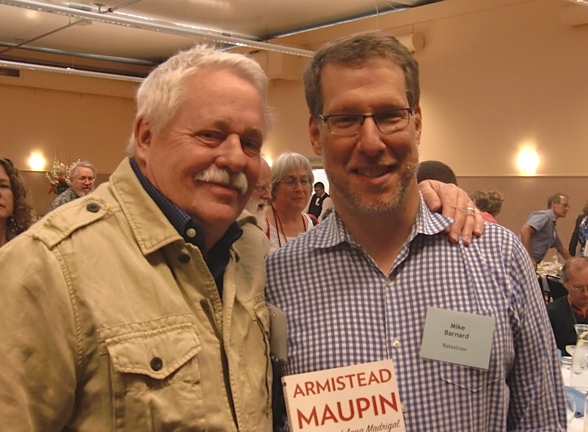 |
| Armistead Maupin with Michael Barnard, owner of Rakestraw Books in Danville, Calif. |
Also featured at the buzz lunch were Carla Buckley, talking about her upcoming novel, The Deepest Secret (Bantam), in which a family deals with a child fatally sensitive to light; Drew Perry, who shared how his second novel, Kids These Days (Algonquin), mirrored his own fears of becoming a parent (which he overcame); and Arlo Crawford, the son of '60s back-to-the-land parents, who talked about his memoir, A Farm Dies Once a Year (Holt).
Farrar, Straus & Giroux's Spenser Lee introduced Ishmael Beah at the lunch; his new book, Radiance of Tomorrow (Sarah Crichton Books), recounts his experience working with the United Nations. Beah explores why people return to places devastated by war and what traditions they lose or keep. "When they return, they are no longer the same," he said.
Internationally known, but specially claimed by Northern California booksellers, Armistead Maupin concluded the lunch by saying The Days of Anna Madrigal (Harper) is the last of the Tales of the City novels. It picks up with Anna at 91, but also goes back into the childhood of the famous transgendered landlady of 28 Barbary Lane. "It's the same story of sex, death, love and Episcopal cannibalism," said Maupin. "It seems fitting to end with [Anna], since she is the mother of us all."
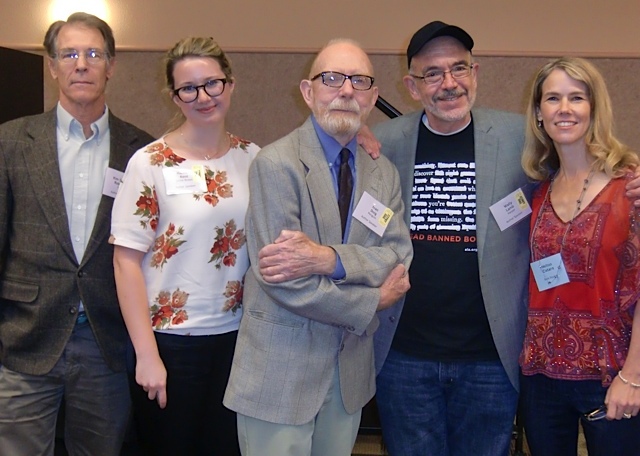 |
| Brunch speakers Kim Stanley Robinson, Hannah Kent, Ivan Doig and Wally Lamb with Melissa Cistaro from Book Passage in Corte Madera, Calif. |
At brunch the following day, Ivan Doig said it was a pleasure to be with Bay Area booksellers again, "especially with a novel that opens on Nob Hill." In Sweet Thunder (Riverhead), Doig brings his character Morrie Morgan back to Butte, Mont., in 1920, following a year-long trip with his bride, which included a visit to San Francisco. Morrie works for the only media outlet not owned by the Anaconda Company in Butte, a town Doig said both he and his character like to call "the Constantinople of the Rockies."
Although Kim Stanley Robinson's Shaman (Orbit) takes place 32,000 years ago, the one-time bookseller said he considers the book to fit right into his sci-fi oeuvre. In science fiction the question is, "what will we become in the future?" explained Robinson. Looking back, he said, the question is, "what were we like?" before books and writing existed.
Hannah Kent, author of Burial Rites (Little, Brown), said she is often asked how a young woman from Australia came to write about the last woman in Iceland to be executed for murder. The answer lies in a high school graduate's desire to put off real life by applying for a Rotary scholarship in a place that had snow--something the Aussie had never seen. "Turns out I was the sole applicant for Iceland," said Kent. While everyone in town knew her, no one ever approached her, and when her kind host family took Kent to the remote spot where the convicted murderess Agnes was beheaded in 1829, the lonely teenager found herself relating to Agnes's isolation: after her conviction, Agnes, also a teenager, was sent to live on an isolated farm because there was no prison for her. "I wanted to give Agnes a chance to tell her story in her own words," said Kent, "even if only in fiction."
For his new novel, We Are Water (Harper), Wally Lamb said he took two events from his Connecticut upbringing--a flood in which a young mother succumbed seconds after handing her children to safety in her husband's arms and the small community's reaction to a black outsider artist who dared to marry a white woman--to act as poles on which "electrodes" crackled out a story.
On behalf of all the lunch speakers, Lamb thanked the booksellers for connecting their work with readers. "The writer and the reader are two poles," said Lamb, "and you, ladies and gentlemen, are the electricity that brings us together." --Bridget Kinsella
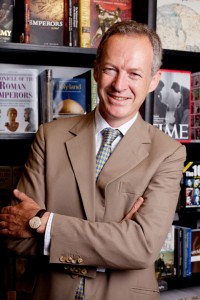 In a long profile in the Guardian, James Daunt, managing director of Waterstones, said that the British bookselling chain's losses have decreased and it may have profit "next year if we're lucky."
In a long profile in the Guardian, James Daunt, managing director of Waterstones, said that the British bookselling chain's losses have decreased and it may have profit "next year if we're lucky."




IPC.0204.S3.INDIEPRESSMONTHCONTEST.gif)



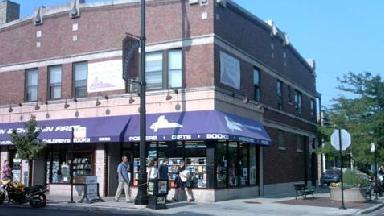 Another great bookstore--
Another great bookstore--
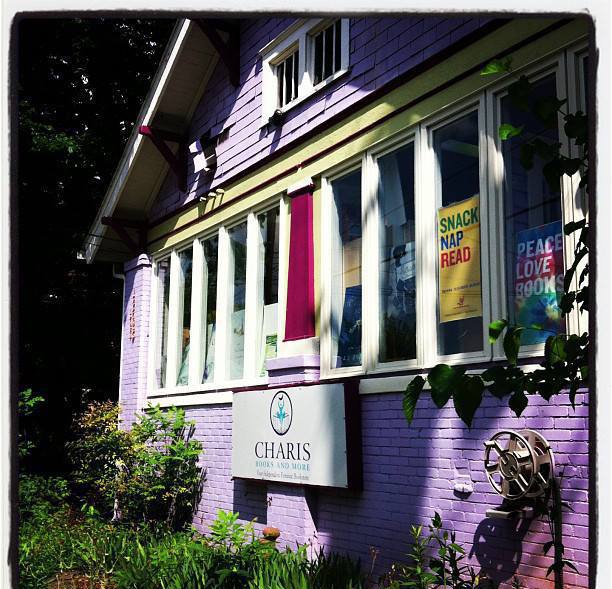 "We had 20 different LGBT writers from different segments of the queer community. It was a beautiful event," said Elizabeth Anderson, executive director of Charis Circle, the nonprofit arm of Charis Books & More. "This event was certainly more visible than others we've had. I don't know if that had anything to do with the timing... but also some other businesses in Little 5 Points were hit [with graffiti]."
"We had 20 different LGBT writers from different segments of the queer community. It was a beautiful event," said Elizabeth Anderson, executive director of Charis Circle, the nonprofit arm of Charis Books & More. "This event was certainly more visible than others we've had. I don't know if that had anything to do with the timing... but also some other businesses in Little 5 Points were hit [with graffiti]." The union seeking collective bargaining agreements at two of Amazon's German warehouses is
The union seeking collective bargaining agreements at two of Amazon's German warehouses is  Children's books were as prominent as adult titles at the Northern California Independent Booksellers Association meeting and trade show held last week in South San Francisco--further proof that the association has taken its commitment to kids' books seriously two years after absorbing the Northern California Children's Booksellers Association.
Children's books were as prominent as adult titles at the Northern California Independent Booksellers Association meeting and trade show held last week in South San Francisco--further proof that the association has taken its commitment to kids' books seriously two years after absorbing the Northern California Children's Booksellers Association.




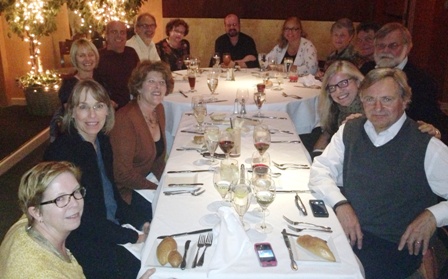 During last week's Northern California Independent Booksellers Association trade show, Penguin's and Random House's adult and children's local field sales reps celebrated their recent coming together as colleagues.
During last week's Northern California Independent Booksellers Association trade show, Penguin's and Random House's adult and children's local field sales reps celebrated their recent coming together as colleagues.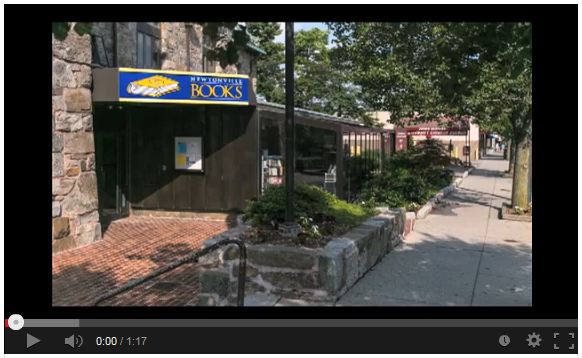
 breathe bookstore café
breathe bookstore café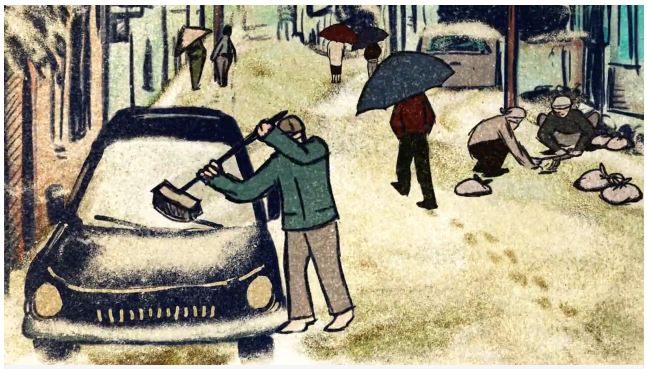 Three Scenarios in Which Hana Sasaki Grows a Tail
Three Scenarios in Which Hana Sasaki Grows a Tail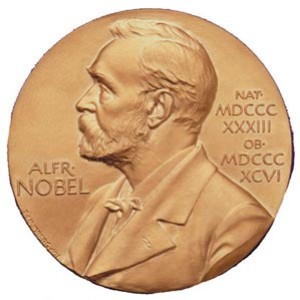 As the Swedish Academy holds its collective breath in preparation for the announcement of this year's winner of the Nobel prize in literature (Will it happen this week? Maybe, though the Academy's website still coyly indicates: "The date will be set later."), British bookmakers had to suspend betting temporarily recently after a
As the Swedish Academy holds its collective breath in preparation for the announcement of this year's winner of the Nobel prize in literature (Will it happen this week? Maybe, though the Academy's website still coyly indicates: "The date will be set later."), British bookmakers had to suspend betting temporarily recently after a 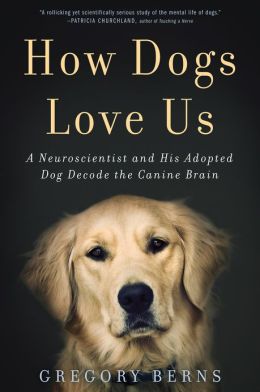 Ever wondered how deeply dogs reciprocate our affection? Gregory Berns, a neuroscientist and professor of neuroeconomics at Emory University, thought about this while mourning his beloved pug, Newton. In his work with addiction and reward centers in the brain, Berns used fMRIs (functional magnetic resonance imaging) to open "the black box of the human mind." Turning to his lab team, Berns brought up the possibility of creating a "functional homology" (a mapping between the brains of two different species) that could decode the canine brain to discover empirically what--and how--dogs think.
Ever wondered how deeply dogs reciprocate our affection? Gregory Berns, a neuroscientist and professor of neuroeconomics at Emory University, thought about this while mourning his beloved pug, Newton. In his work with addiction and reward centers in the brain, Berns used fMRIs (functional magnetic resonance imaging) to open "the black box of the human mind." Turning to his lab team, Berns brought up the possibility of creating a "functional homology" (a mapping between the brains of two different species) that could decode the canine brain to discover empirically what--and how--dogs think.